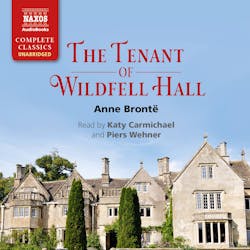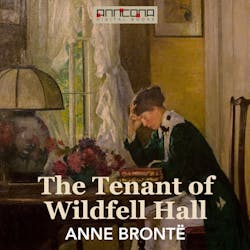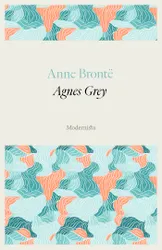Anne Brontë's 'The Tenant of Wildfell Hall (Unabridged)' is a groundbreaking novel that addresses themes of marital abuse, female independence, and the societal double standards of the 19th century. The story follows Helen Graham, a young widow who moves to Wildfell Hall with her son to escape her troubled past, causing a scandal among the townspeople. Brontë's writing is known for its vivid descriptions and strong moral messages, making this book a compelling read for those interested in feminist literature of the Victorian era. The novel's structure, with letters and diary entries, provides a unique and engaging narrative style that adds depth to the characters and their motivations. Anne Brontë, the youngest of the Brontë sisters, drew inspiration from her own experiences as a governess and her observations of the limitations placed on women in society. Her bold approach to tackling controversial topics in 'The Tenant of Wildfell Hall' showcases her progressive views and her commitment to challenging societal norms. Through her writing, Brontë aimed to shed light on the injustices faced by women and encourage conversation about gender equality. I highly recommend 'The Tenant of Wildfell Hall (Unabridged)' to readers interested in exploring the complexities of gender roles, marriage, and social expectations in the Victorian era. Anne Brontë's powerful storytelling and thought-provoking themes make this novel a must-read for fans of classic literature and feminist fiction.

Library of Masterpieces - 100 Books to Read in a Lifetime
illiam Shakespeare, Fyodor Dostoevsky, Louisa May Alcott, Miguel de Cervantes, John Milton, Jane Austen, Charlotte Brontë, Emily Brontë, Anne Brontë, William Makepeace Thackeray, George Eliot, Charles Dickens, Thomas Hardy, Jonathan Swift, Daniel Defoe, Joseph Conrad, Robert Louis Stevenson, Mary Shelley, Bram Stoker, Arthur Conan Doyle, Wilkie Collins, Oscar Wilde, T. S. Eliot, D. H. Lawrence, James Joyce, Virginia Woolf, E. M. Forster, Evelyn Waugh, Aldous Huxley, George Orwell, H. G. Wells, Lewis Carroll, Frances Hodgson Burnett, Kenneth Grahame, C. S. Lewis, Malcolm Lowry, Ford Madox Ford, Mark Twain, Jack London, Herman Melville, Ernest Hemingway, Jack Kerouac, Nathaniel Hawthorne, Edith Wharton, Walt Whitman, Kate Chopin, Harriet Beecher Stowe, Neale Hurston, Richard Wright, Raymond Chandler, Dashiell Hammett, F. Scott Fitzgerald, John Steinbeck, William Faulkner, Margaret Mitchell, Sylvia Plath, Carson McCullers, L. Frank Baum, L. M. Montgomery, Leo Tolstoy, Ivan Turgenev, Nikolai Gogol, Johann Wolfgang von Goethe, Friedrich Nietzsche, Thomas Mann, Franz Kafka, Erich Maria Remarque, Albert Camus, Marcel Proust, Jules Verne, Victor Hugo, Gustave Flaubert, Stendhal, Alexandre Dumas, Henrik Ibsen, Rudyard Kipling, Homer, Sophocles, Virgil, Laozi, Sun Tzu, Plato, Marcus Aurelius, Dante Alighieri, Niccolò Machiavelli
book
90 Masterpieces You Must Read (Vol.1) : Novels, Poetry, Plays, Short Stories, Essays, Psychology & Philosophy: The Madman, Moby-Dick, Siddhartha, Crime and Punishment, Hamlet, Great Expectations, Little Women, Meditations, The Einstein Theory, Heart of Darkness, The Red Badge of Courage
Walt Whitman, Herman Hesse, George Eliot, Kahlil Gibran, Anton Chekhov, Herman Melville, Oscar Wilde, Fyodor Dostoevsky, Nikolai Gogol, James Joyce, Henry David Thoreau, William Shakespeare, T. S. Eliot, John Keats, Charles Baudelaire, Walter Scott, Daniel Defoe, Louisa May Alcott, Jane Austen, Charlotte Brontë, Emily Brontë, Anne Brontë, Leo Tolstoy, Benito Pérez Galdós, William Makepeace Thackeray, Pierre Choderlos de Laclos, R.D. Blackmore, Alexandre Dumas, Marcel Proust, D. H. Lawrence, Charles Dickens, Thomas Hardy, Henry James, Guy de Maupassant, Princess Der Ling, Victor Hugo, Juan Valera, Anthony Trollope, Stephen Crane, E. M. Forster, Theodore Dreiser, Margaret Cavendish, Upton Sinclair, Plato, Apuleius, Marcus Aurelius, Sun Tzu, Voltaire, Miguel de Cervantes, Giovanni Boccaccio, Frederick Douglass, Sigmund Freud, H. A. Lorentz, Wallace D. Wattles, James Allen, Agatha Christie, Arthur Conan Doyle, Joseph Conrad, H. P. Lovecraft, Washington Irving, Mary Shelley, H. G. Wells, Edgar Allan Poe, Ernest Hemingway, L. Frank Baum, Robert Louis Stevenson, Mark Twain, Selma Lagerlöf, Jack London, Jules Verne, Lewis Carroll, Frances Hodgson Burnett, Rudyard Kipling, George Bernard Shaw, Soseki Natsume, Johann Wolfgang Goethe, Edgar Rice Burroughs, Brothers Grimm, Hans Christian Andersen
book
The Tenant of Wildfell Hall
Anne Brontë
audiobookbook
The Tenant of Wildfell Hall
Anne Brontë
audiobookbook
180 Masterpieces You Should Read Before You Die (Vol.1) : Leaves of Grass, Siddhartha, Middlemarch, The Jungle, Macbeth, Moby-Dick, A Study in Scarlet, The Call of the Wild, Huckleberry Finn,, The Way We Live Now, Sister Carrie...
Walt Whitman, George Eliot, Herman Hesse, Kahlil Gibran, Anton Chekhov, Herman Melville, Oscar Wilde, Fyodor Dostoevsky, William Shakespeare, Mark Twain, Marcus Aurelius, Nikolai Gogol, James Joyce, Henry David Thoreau, T. S. Eliot, John Keats, Charles Baudelaire, Walter Scott, Daniel Defoe, Louisa May Alcott, Jane Austen, Charlotte Brontë, Emily Brontë, Anne Brontë, Leo Tolstoy, Victor Hugo, Jules Verne, Lewis Carroll, Frances Hodgson Burnett, Brothers Grimm, Hans Christian Andersen, Agatha Christie, Wallace D. Wattles, James Allen, Sigmund Freud, Miguel de Cervantes, Frederick Douglass, Voltaire, Sun Tzu, Plato, Upton Sinclair, Anthony Trollope, E. M. Forster, Theodore Dreiser, Charles Dickens, Thomas Hardy, Henry James, D. H. Lawrence, William Makepeace Thackeray, Marcel Proust, H. G. Wells, Edgar Allan Poe, Ernest Hemingway
book
50 Feminist Masterpieces you have to read before you die (Golden Deer Classics)
Louisa May Alcott, Jane Austen, Anne Brontë, Kate Chopin, Charlotte Perkins Gilman, Emma Goldman, Virginia Woolf, Clara Zetkin, Mary Wollstonecraft, Edith Wharton, Mark Twain, Dora B. Montefiore, Henry James, Golden Deer Classics
book
The Ultimate Book Club: 180 Books You Should Read (Vol.1) : Leaves of Grass, Siddhartha, Middlemarch, The Jungle, Macbeth, Moby-Dick, A Study in Scarlet…
Jules Verne, Lewis Carroll, Selma Lagerlöf, Sigmund Freud, Charles Dickens, Plato, Mark Twain, Walt Whitman, Oscar Wilde, Robert Louis Stevenson, Edgar Allan Poe, William Shakespeare, Giovanni Boccaccio, Charlotte Brontë, Anne Brontë, Emily Brontë, Henry David Thoreau, Jack London, Henry James, Louisa May Alcott, Victor Hugo, Arthur Conan Doyle, Frances Hodgson Burnett, Joseph Conrad, Jane Austen, Edgar Rice Burroughs, Herman Melville, James Allen, Guy de Maupassant, George Eliot, Thomas Hardy, Benito Pérez Galdós, Daniel Defoe, Agatha Christie, Upton Sinclair, Anthony Trollope, Alexandre Dumas, Rudyard Kipling, Marcel Proust, Washington Irving, Juan Valera, Charles Baudelaire, William Makepeace Thackeray, Theodore Dreiser, Voltaire, Apuleius, Stephen Crane, Frederick Douglass, John Keats, James Joyce, Kahlil Gibran, Ernest Hemingway, Soseki Natsume, Princess Der Ling, L. Frank Baum, H. G. Wells, H. A. Lorentz, T. S. Eliot, D. H. Lawrence, E. M. Forster, H. P. Lovecraft, Marcus Aurelius, Hans Christian Andersen, Anton Chekhov, Leo Tolstoy, Fyodor Dostoevsky, Sir, George Bernard Shaw, Miguel de Cervantes, Mary Shelley, Wallace D. Wattles, R.D. Blackmore, Pierre Choderlos de Laclos, Johann Wolfgang Goethe, Margaret Cavendish, Herman Hesse, Sun Tzu, Gogol
book
150 Classics You Should Read Before You Die : Romeo and Juliet, Emma, Vanity Fair, Middlemarch, Tom Sawyer, Faust, Notre Dame de Paris, Dubliners, Odyssey
Johann Wolfgang von Goethe, Stendhal, Jules Verne, Gustave Flaubert, Lewis Carroll, Charles Dickens, Plato, Honoré de Balzac, Mark Twain, Harriet Beecher Stowe, Walt Whitman, Oscar Wilde, Robert Louis Stevenson, James Fenimore Cooper, Edgar Allan Poe, William Shakespeare, George MacDonald, Bram Stoker, Charlotte Brontë, Anne Brontë, Emily Brontë, Henry David Thoreau, Jack London, Henry James, Louisa May Alcott, Victor Hugo, Arthur Conan Doyle, Frances Hodgson Burnett, Joseph Conrad, Jane Austen, Herman Melville, George Eliot, Laurence Sterne, Thomas Hardy, Jonathan Swift, Edith Wharton, Daniel Defoe, Henry Fielding, Kenneth Grahame, Marcel Proust, Willa Cather, Nathaniel Hawthorne, Homer, Gaston Leroux, William Makepeace Thackeray, Kate Chopin, Apuleius, John Milton, Frederick Douglass, John Keats, James Joyce, Ann Ward Radcliffe, Kahlil Gibran, H. G. Wells, W. B. Yeats, J. M. Barrie, G. K. Chesterton, T. S. Eliot, L. M. Montgomery, C. S. Lewis, D. H. Lawrence, E. M. Forster, H. P. Lovecraft, Marcus Aurelius, Friedrich Nietzsche, Lewis Wallace, Sir, George Bernard Shaw, Mary Shelley, P. B. Shelley, Elizabeth von Arnim, Herman Hesse, George Weedon Grossmith, Willkie Collins
book
90 World Classics You Should Read Before You Die (Vol.1)
Jules Verne, Lewis Carroll, Selma Lagerlöf, Sigmund Freud, Charles Dickens, Plato, Mark Twain, Walt Whitman, Oscar Wilde, Robert Louis Stevenson, Edgar Allan Poe, William Shakespeare, Giovanni Boccaccio, Charlotte Brontë, Anne Brontë, Emily Brontë, Henry David Thoreau, Jack London, Henry James, Louisa May Alcott, Victor Hugo, Arthur Conan Doyle, Frances Hodgson Burnett, Joseph Conrad, Jane Austen, Edgar Rice Burroughs, Herman Melville, James Allen, Guy de Maupassant, George Eliot, Walter Scott, Thomas Hardy, Benito Pérez Galdós, Daniel Defoe, Agatha Christie, Upton Sinclair, Anthony Trollope, Alexandre Dumas, Rudyard Kipling, Marcel Proust, Washington Irving, Juan Valera, Charles Baudelaire, William Makepeace Thackeray, Theodore Dreiser, Voltaire, Apuleius, Stephen Crane, Frederick Douglass, John Keats, James Joyce, Kahlil Gibran, Soseki Natsume, Princess Der Ling, L. Frank Baum, H. G. Wells, H. A. Lorentz, T. S. Eliot, D. H. Lawrence, E. M. Forster, H. P. Lovecraft, Marcus Aurelius, Hans Christian Andersen, Anton Chekhov, Leo Tolstoy, Fyodor Dostoevsky, Nikolai Gogol, George Bernard Shaw, Miguel de Cervantes, Mary Shelley, Wallace D. Wattles, R.D. Blackmore, Pierre Choderlos de Laclos, Johann Wolfgang Goethe, Brothers Grimm, Margaret Cavendish, Herman Hesse, Sun Tzu, John W. Campbell
book
Agnes Grey
Anne Brontë
book
The Love of Romance - 50 Books in One Collection : The Greatest Romance Classics of All Time
Stendhal, Charles Dickens, William Shakespeare, Burton Egbert Stevenson, Charlotte Brontë, Anne Brontë, Emily Brontë, Henry James, Louisa May Alcott, Jane Austen, George Eliot, Walter Scott, Thomas Hardy, O. Douglas, Edith Wharton, Alexandre Dumas, Meredith Nicholson, Virginia Woolf, Nathaniel Hawthorne, Gaston Leroux, Grace Livingston Hill, Theodore Dreiser, Kate Chopin, Earl Derr Biggers, Fanny Burney, Georgette Heyer, H. G. Wells, E. M. Forster, F. Scott Fitzgerald, Leo Tolstoy, Elizabeth Gaskell, P.G. Wodehouse, R.D. Blackmore, Pierre Choderlos de Laclos, Madeleine L'Engle
book
150 Classics You Should Read Before You Die : Romeo and Juliet, Emma, Vanity Fair, Middlemarch, Tom Sawyer, Faust, Notre Dame de Paris, Dubliners, Odyssey
Johann Wolfgang von Goethe, Stendhal, Jules Verne, Gustave Flaubert, Lewis Carroll, Charles Dickens, Plato, Honoré de Balzac, Mark Twain, Harriet Beecher Stowe, Walt Whitman, Oscar Wilde, Robert Louis Stevenson, James Fenimore Cooper, Edgar Allan Poe, William Shakespeare, George MacDonald, Bram Stoker, Charlotte Brontë, Anne Brontë, Emily Brontë, Henry David Thoreau, Jack London, Henry James, Louisa May Alcott, Victor Hugo, Arthur Conan Doyle, Frances Hodgson Burnett, Joseph Conrad, Jane Austen, Herman Melville, George Eliot, Laurence Sterne, Thomas Hardy, Jonathan Swift, Edith Wharton, Daniel Defoe, Henry Fielding, Kenneth Grahame, Marcel Proust, Willa Cather, Nathaniel Hawthorne, Homer, Gaston Leroux, William Makepeace Thackeray, Kate Chopin, Apuleius, John Milton, Frederick Douglass, John Keats, James Joyce, Ann Ward Radcliffe, Kahlil Gibran, H. G. Wells, W. B. Yeats, J. M. Barrie, G. K. Chesterton, T. S. Eliot, L. M. Montgomery, C. S. Lewis, D. H. Lawrence, E. M. Forster, H. P. Lovecraft, Marcus Aurelius, Friedrich Nietzsche, Lewis Wallace, Sir, George Bernard Shaw, Mary Shelley, P. B. Shelley, Elizabeth von Arnim, Herman Hesse, George Weedon Grossmith, Willkie Collins
book
